Vaccines: The myths, facts, and foolishness, persist …
A favorite expat online forum carried a post with a simple query: “Do we need proof of current yellow fever and typhoid vaccinations to enter Ecuador from Colombia?” (No).
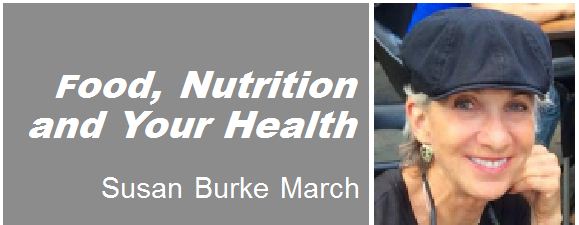
This simple question escalated into an epidemic of opinions, some backed by facts, some by foolishness.
Two years later, the same forum carried a post from an expat who informed the readers that a toddler living in El Centro, recently immigrating from outside Ecuador, had contracted the measles. Countrywide, Ecuador has a vaccination rate of approximately 80 percent. Cuenca had not seen a case of measles in many years.
The Ministry of Health in Cuenca was offering free measles vaccinations, targeting children and “travelers,” including expats and tourists. Please see my column “Measles in Cuenca: Facts and Fiction.”
In both cases, some individuals posted outlandish replies, such as vaccines are “deadly at worst and worthless at best.” One person testified that she never took a vaccine and never got sick.
Ah, my favorite anti-science protester, so easy to spot. The “N = 1.” The person who believes that her or his personal experience is the best evidence of future outcomes.
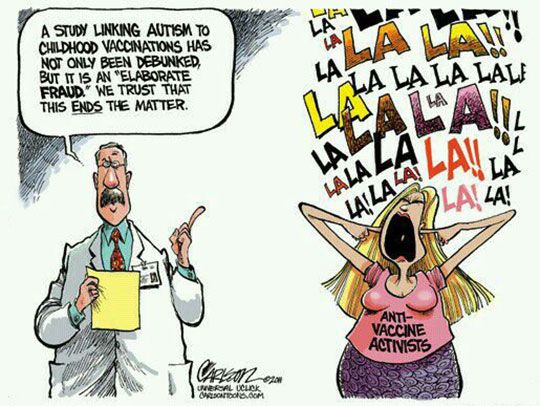
She pronounced her self-actualized impermeability against diseases that infect lesser humans. What could be behind this phenomenon? She assured all it was her superior lifestyle that safeguarded against all pathogenic bugs or viruses.
She insisted all diseases are manifestations of underlying lifestyle negligence, made worse by modern medicine.
Painting with a very broad brush, she pronounced all vaccines as toxic, that all contain mercury and thimerosal; and that all vaccines lead to Parkinson’s, dementia, and more.
A rational reader attempted to contribute some factual and accurate comments: no vaccines contain mercury. Thimerosal is made from ethyl mercury, which is as different from methyl mercury (toxic) as ethyl alcohol (what you find in spirits and wine) is from methyl alcohol (wood alcohol, which will make you blind). He added some facts on the safety record of the ingredients in vaccines, but the facts did not slow her down.
More than one opined that “Big Pharma” was conspiring with the government to “force” people into vaccination.
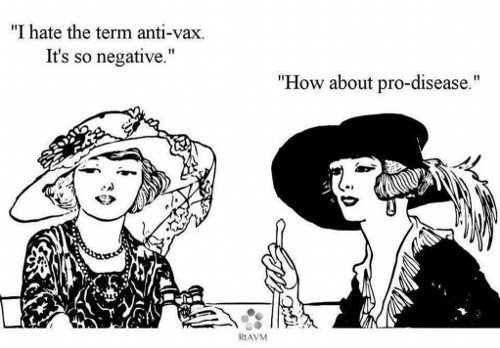
This reminds me of something told to me by a pharmacist in the U.S. A patient suffering from yet another outbreak of the debilitatingly painful shingles virus was picking up his prescription for the antiviral drug valacyclovir — cost $265 — and he had no insurance.
This was the third or fourth time he’d had to buy this drug to treat this painful outbreak, and the pharmacist told him that they could offer the shingles vaccine, Zostavax, for $220. The man said, “No thanks, I don’t want to support “Big Pharma.”
[Zostavax is only about 51 percent effective but the Shingrix vaccine is 90 percent effective even at older ages. Unfortunately not yet available in Ecuador, it is available in the U.S. and Canada, and other countries. Read my column on the Shingrix vaccine.]
“Big Pharma.” Sigh.
This ignorance isn’t isolated to a few posting online. Many other conspiracy theorists write, post, and hawk their own products as “professionals” and profit by promoting their personal agendas. Their certainty against modern medicine is unvarnished opinion, not based on facts.
And what about “Little Pharma?” That is what I call those who label all modern medicine and pharmaceuticals disparagingly, all the while hawking their own potions, herbs and “therapies.” As if they don’t market and merchandise and yes, profit from their unfounded “prescriptions” and “treatments.” Of course, they don’t have to prove that their remedies work: no scientific randomized studies, no clinical trials to prove safety or efficacy.
Conspiracy theorists appear to make sense out of a world that is otherwise confusing, dividing the world sharply into forces of light and forces of darkness. Instead of understanding the science, they congratulate themselves on penetrating the corrupt mainstream “allopathic medicine” while branding the masses as a brainwashed herd.

The consensus of health experts around the world is that vaccination — making people immune to diseases caused by viruses or bacteria — is unquestionably one of the most cost-effective public health measures available.
The European Commission on Public Health notes that widespread vaccination has eradicated smallpox and made Europe polio-free. In Cuba, vaccines aren’t only seen as a basic human right, but also as an obligation.
As published in the journal BMC Public Health, in 2011-2012 an outbreak of measles occurred in Ecuador. A study sought to ascertain which population characteristics were associated. Researchers found that the highest risk for infection was found in indigenous children less than one year of age in the Pastaza and Tungurahua parishes, and those with the lowest vaccination coverage were the most vulnerable during the measles outbreak.
Vaccines are not without risk, but it is infinitesimal compared with the risk of contracting the disease — fewer than one out of a million doses come with a negative side effect. You’re 100 times more likely to be hit by lightning than you are to suffer a serious allergic reaction to the MMR vaccine.
Measles is a highly infectious viral disease that remains a leading cause of death in children worldwide. Among its more severe complications, measles can cause pneumonia, blood disorders, encephalitis, pneumonia, and death. After patients cough or sneeze, the virus particles can survive as long as two hours on doorknobs, handrails, elevator buttons and even in the air.
According to the World Health Organization (WHO), despite the fact that a vaccine has been available for decades, about 400 people died from measles every day in 2013. Before vaccination became widespread, the disease killed about 2.6 million people per year.
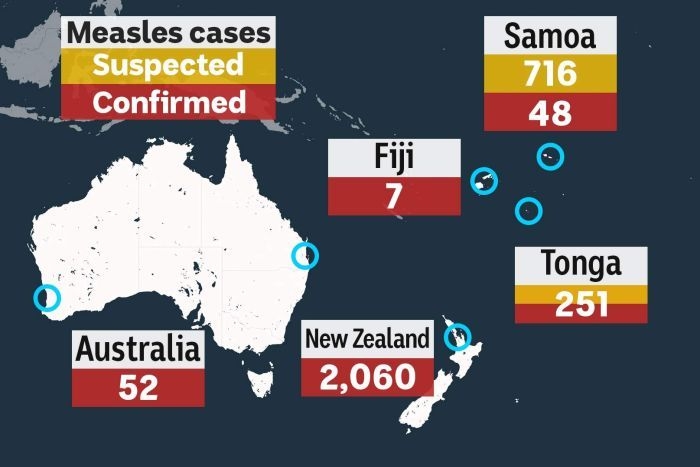
This 2019 outbreak is believed to have started in New Zealand, where there have been 2,060 confirmed cases of measles just this year, before spreading to Samoa and other nations across the region — including Australia.
Just yesterday (December 3, 2019) The New York Times reported the government of Samoa is shutting down all public services for two days to fight a measles outbreak that has killed 60 people and infected thousands of others in the South Pacific island nation over the past two months. Nearly 3,900 cases of measles have been reported in the country, whose population is just 200,000. Schools have been shuttered since the government declared the outbreak a national emergency last month.
In the United States, the CDC reports that from January 1 to November 7, 2019, 1,261 individual cases of measles have been confirmed in 31 states. This is the greatest number of cases reported in the U.S. since 1992. More than 75 percent of the cases this year are linked to recent outbreaks in New York. Measles is more likely to spread and cause outbreaks in U.S. communities where groups of people are unvaccinated. The majority of cases are among people who were not vaccinated against measles and 123 of the people who got measles this year were hospitalized, and 61 reported having complications, including pneumonia and encephalitis.
Why are we going backward? What is the source of the misinformation?
The MMR vaccine controversy began with the 1998 publication of a fraudulent research paper in the medical journal The Lancet that lent support to the later discredited claim that colitis and autism spectrum disorders (ASD) are linked to MMR vaccine.
The media have been criticized for their naïve reporting and for lending undue credibility to the architect of the fraud, Andrew Wakefield, a gastroenterologist who was found to be a paid consultant to the attorneys of parents who believed their children had been harmed by vaccines. His license to practice medicine was revoked.
But he’s resurfaced in Austin, Texas. As reported in The Dallas News, “Wakefield — who is no longer a doctor, having been booted from the profession in his home country — met repeatedly with immigrant families in a Minnesota Somali community, where legitimate concern over autism diagnoses had taken root.
That community is now ground zero for the state’s worst measles outbreak in three decades. More than 40 people — nearly all children — have been infected with the disease, which was previously, thanks to vaccines, eradicated in the U.S.”
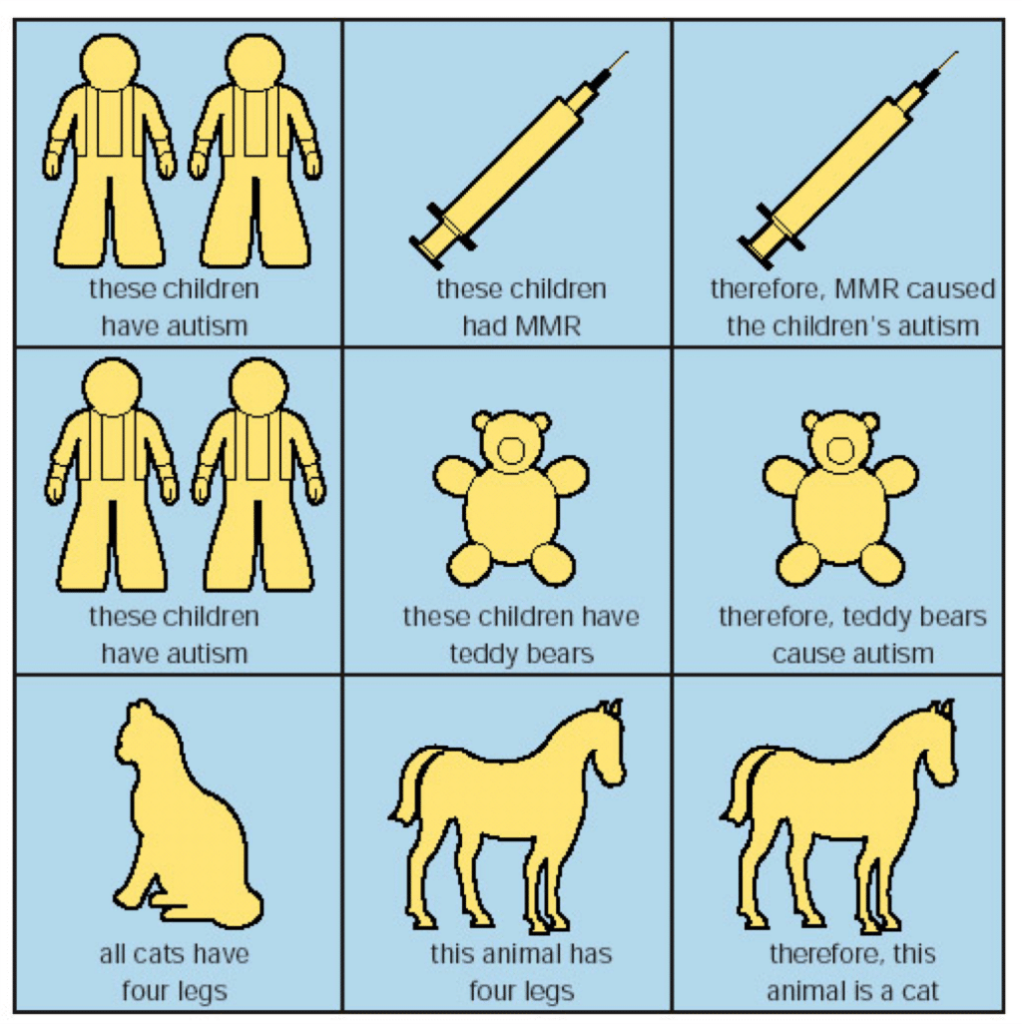
There is no scientific proof that the MMR vaccine–or any other vaccine–causes autism.
What does exist is a correlation in time between when children are immunized and when they are diagnosed with autism. In other words, children are vaccinated at various times throughout early childhood. ASD is also often diagnosed during early childhood. Just because two events like these happen around the same time does not mean that one causes the other (“correlation does not equal causation”). Media reports, activist groups, and even some respected medical professionals (turned authors) can scare people with more subjective evidence into believing vaccines cause autism.”
Is it possible that your lifestyle can make you “immune” from contagious diseases like measles, mumps, and rubella? No doubt, having a resilient immune system is critical for good health. Eating a balanced diet full of raw and safely cooked quality foods, avoiding processed food, getting adequate rest and sleep, decompressing with stress-reducing activities, and not contaminating your lungs by inhaling smoke from tobacco or other herbs, or from “vaping” nicotine or other substances will boost your immunity, significantly.

I was born before 1957 (!) but still obtained the free measles and rubella booster at the Ministry of Health in 2016.
To learn additional important facts about the MMR that are also relevant to readers residing in Ecuador or overseas click here. (Source: San Diego Times Union)
Some adults may need an MMR booster shot: Anyone born before 1957 likely has immunity because the virus was in wide circulation until the first vaccine was introduced in 1963. However, a second booster shot was not added to the childhood vaccination schedule until 1989. So adults born after 1957 but before 1985 may have received only one MMR shot and may benefit from a booster.
Also, the CDC recommends two MMR doses for anyone who received an inactivated or “killed” measles vaccine, or one of unknown origin, from 1963 to 1967. That’s because more recent versions of the vaccine are more effective.
A blood test can be used to show whether inoculation was effective. Doctors can perform this test upon request. In most patients, full immunity is established about two weeks after vaccination, according to the CDC.
If you can’t remember if you received a second MMR vaccine or you don’t have a record, public-health officials said there is no harm in receiving a potentially third dose as an adult.
The MMR shot has a 99 percent rate of effectiveness, according to the CDC. That means in a population of 1,000 vaccinated adults who are exposed to measles, the vaccine would be expected to protect 990.
Anyone who is pregnant or has had a severe allergic reaction to a previous dose of the vaccine, or to a component present in a different vaccine, should avoid getting the vaccine and the MMR shot should not be administered to anyone with a compromised immune system, such as individuals undergoing treatment for cancer or HIV.
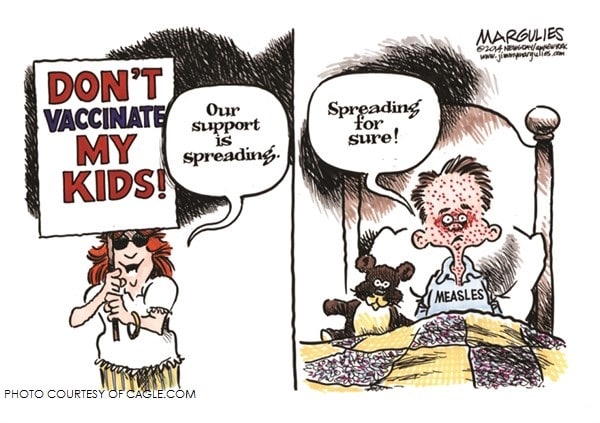 The influenza season is upon us — flu vaccines are available now in Cuenca
The influenza season is upon us — flu vaccines are available now in Cuenca
In the northern hemisphere, the flu season typically runs from November to April. In the southern hemisphere, it runs from April to October and year-round in the tropics, but in Cuenca, many expats travel this time of year. The CDC reminds us that travelers in the Northern and Southern Hemispheres can be exposed to influenza during months that fall outside of those listed above, especially when traveling as part of large tourist groups (e.g., on cruise ships) that include people from areas of the world where influenza viruses are circulating.
In the past couple of weeks, I’ve seen Facebook posts about people getting the flu. I’ve also seen more of the same ignorant posts about vaccines — I’ve even seen one post that advises an herbal remedy to “cure” the flu. Nope. Get your flu vaccine now. Some herbal remedies will, no doubt, help relieve symptoms of the flu, and of the common cold, which is not one virus but could be one of many. But the flu and the common cold will run its course, hopefully, within seven to 10 days. Unfortunately, influenza is a potentially life-threatening virus, while the “common cold” is typically more benign.
As reported in the Harvard Health Blog, unfortunately, many experts are predicting an active, and possibly severe, 2019-2020 flu season. This projection is based on data from Australia, in the Southern Hemisphere, where the flu season is just wrapping up. Australia was hit early and hard by flu this year: over 300,000 patients had laboratory-confirmed influenza, a record number of cases.
The National Foundation for Infectious Diseases writes that annual vaccination is the best way to prevent flu. The vaccine is updated annually to protect against the influenza strains most likely to circulate each season. Even in cases when vaccination does not prevent infection completely, it can reduce the severity of the disease and prevent the most serious complications of flu, including hospitalization and death.
As reported last January in The Cuenca Dispatch, as Azuay Province transitions from dry to wet season, the risk of respiratory illnesses, such as the flu and the common cold, increases.
To help prevent influenza illnesses among the general public, the Ecuador Ministry of Health (MSP) offers free flu vaccines to eligible groups including children under the age of five, pregnant women, people with chronic non-transmissible diseases such as hypertension and diabetes, and senior citizens. Vaccinations are available at any Health Center (Centro de Salud) in the Cuenca area. Bring your identification with you. Many private doctors also offer the flu vaccine. Next week I’ll report more information about influenza 2019, and prevention. My husband and I got our free flu vaccines last week. Painless. Protective.

Ken March seems happy to get his flu shot this year.

“Relaja tu brazo, por favor.”
Certain populations are more at risk for serious health complications from the flu:
- children under the age of five, especially those two years and younger
- children 18 and under who take aspirin or medications that contain salicylate
- adults ages 65 years and older
- pregnant women
- people with serious medical conditions
- people taking immunosuppressive agents (e.g., chemotherapy)
- people with severe obesity
Additional sources:
BMC Public Health. Role of health determinants in a measles outbreak in Ecuador: a case-control study with aggregated data.
Dallas News. Discredited doctor who falsely linked vaccines to autism is now Texas’ toxic export.
Genetic Literacy Project. Joseph Mercola: Alternative health merchant promotes quack cures, funds organic, anti-GMO groups.
Medscape.com (registration required). Pediatric Vaccines: Global Brands and Country Availability.
Public Health Reports. Fifty Years of Global Immunization at CDC, 1066-2015.
Southwest Autism Research & Resource Center. Vaccines and Autism.
The San Diego Union-Tribune. Measles vaccine questions answered.
USA Today. Vaccines: Breaking down and debunking 10 myths.
World Health Organization. Communicable diseases.
___________________________
Susan Burke March, a Cuenca expat, is a Registered Dietitian/Nutritionist and a Certified Diabetes Educator who specializes in smart solutions for weight loss and diabetes-related weight management. She’s the Country Representative from Ecuador of the Academy of Nutrition & Dietetics. Do you have a food, nutrition or health question? Write to her – SusanTheDietitian@gmail.com
















